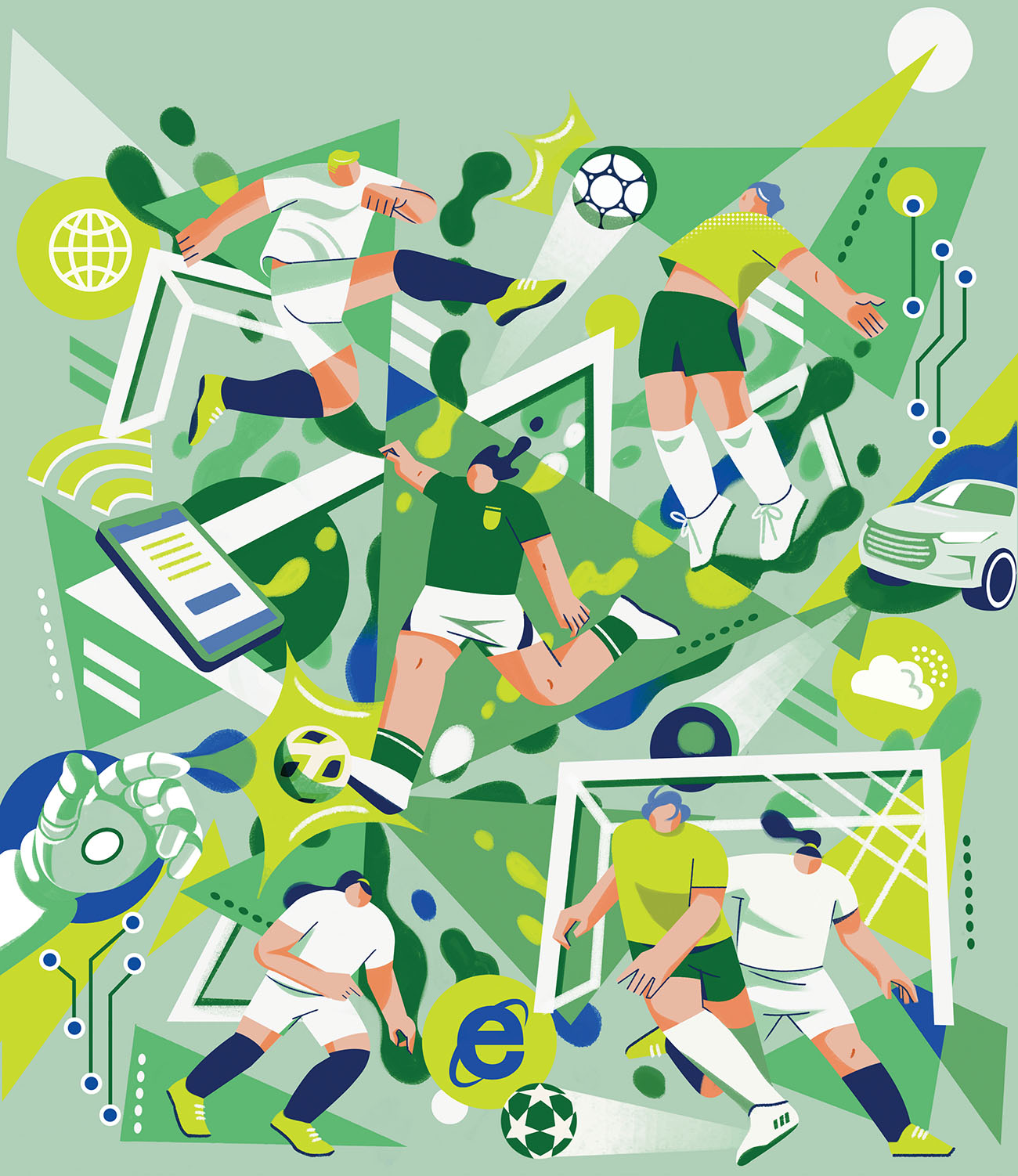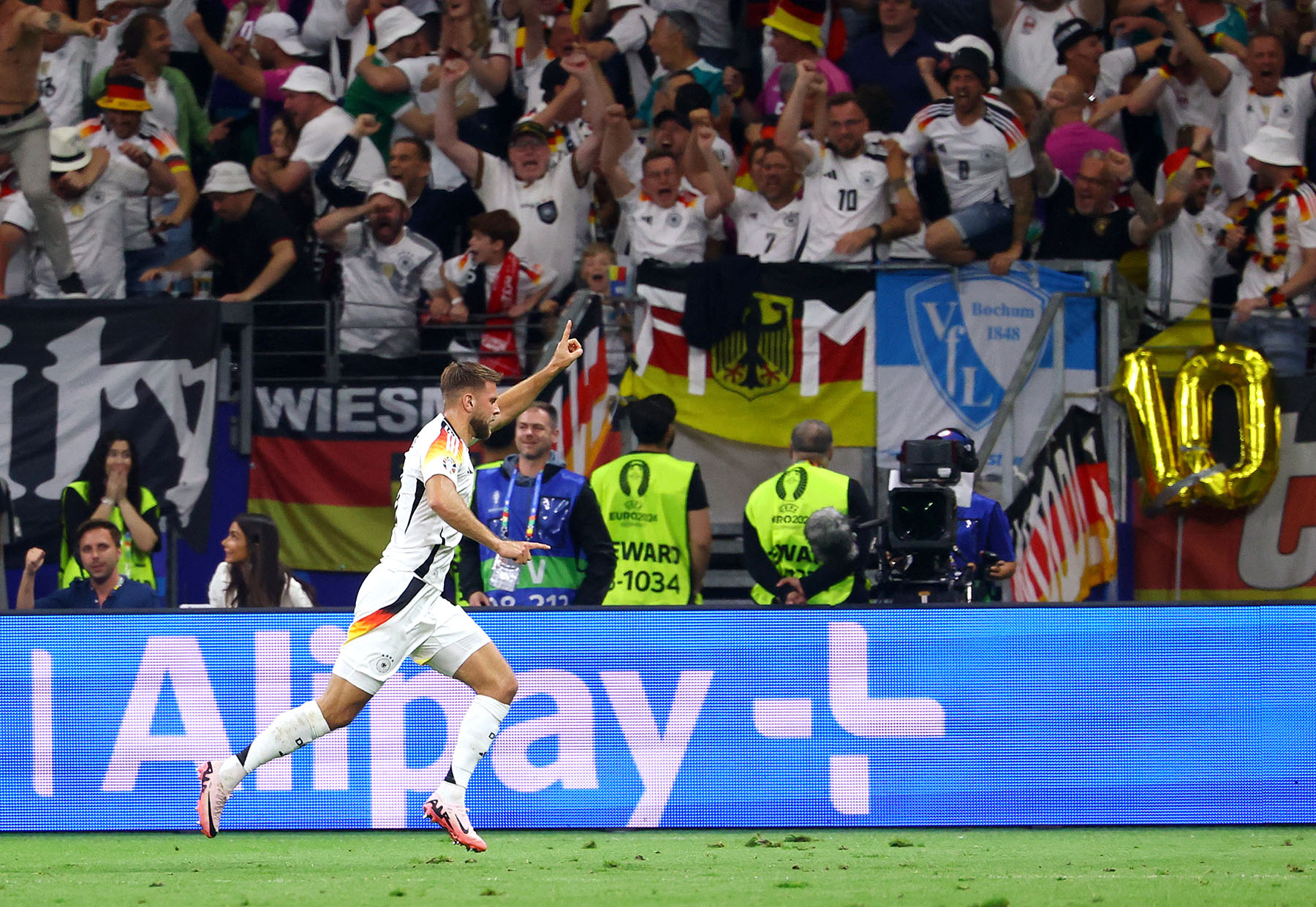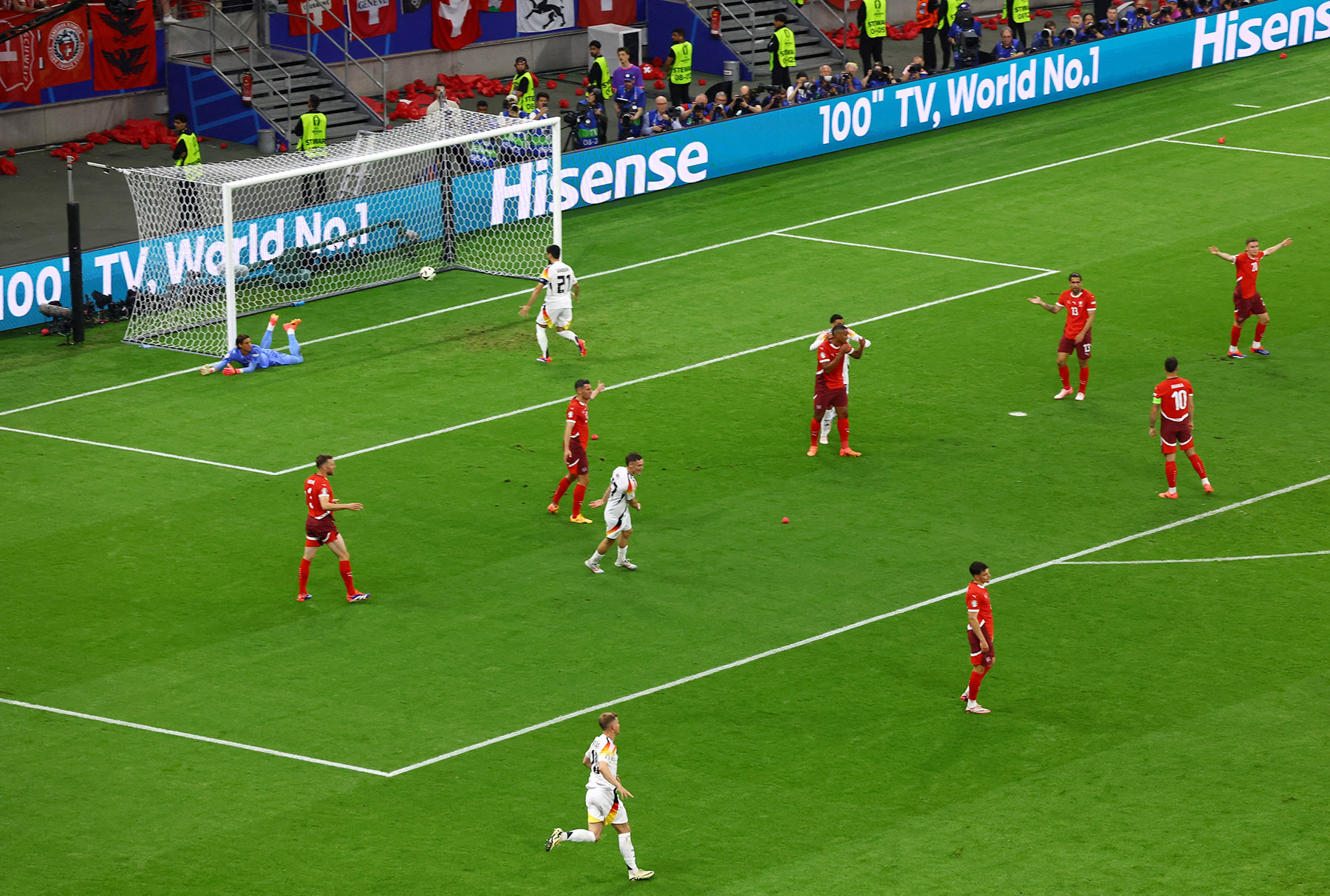Chinese brands grab spotlight at Euro 2024 as top-tier sponsors, amid global ambitions

Although China’s national soccer team is not taking the field at Euro 2024, the country’s flagship companies are filling stadiums and television screens through hefty sponsorship deals and with advertising billboards.
Chinese companies account for more than one-third of the 13 top-tier sponsors at the ongoing UEFA European Championship in Germany, making the country the single-biggest source of sponsorship for the event.
The strong sponsorship demonstrates the rising technological prowess and competitiveness of Chinese brands on the global stage and their commitment to expanding into overseas markets, experts said.
Financial technology company Ant Group, home appliance giant Hisense, e-commerce platform AliExpress, smartphone manufacturer Vivo and electric vehicle maker BYD are among the official global sponsors for the championship, which began on June 14 and runs through July 14, according to UEFA’s website.
As the official payment sponsor of Euro 2024, Alipay+, the cross-border mobile payment platform owned by Ant Group, announced plans to expand cross-border digital payment acceptance, and provide convenient payment services and special benefits for global soccer fans and travelers, through its merchant network, during the tournament.
Together with the company’s two other international brands — Antom merchant payment services and international payments business WorldFirst — Alipay+ has appeared on LED billboards at tournament stadiums and on 50 TV channels across Europe.
The UEFA top scorer trophy, sponsored by Alipay+, will be awarded at the Euro 2024 final in Berlin.
The company is accelerating steps to expand its presence in the United Kingdom and EU countries — including France, Italy, Switzerland, Spain and Germany — as globalization is one of its core strategies.
As of June, over 400,000 merchants in Europe were accepting mobile payments through Alipay+ from 14 international e-wallets and banking apps, according to a news release from the company.
Users of Alipay+ partner wallets can make mobile payments at department stores, supermarkets, convenience stores, airports, duty-free stores, restaurants and tourist attractions by just scanning an Alipay+ QR code.
Alipay+ expects this summer to be busier than usual as sports fans travel from around the world to watch Euro 2024 and the upcoming Paris Olympic Games. The company said it will enable more merchants to benefit from the expected influx of fans, athletes and tourists, via its mobile payment technology and digital solutions.

In 2018, Ant Group’s digital payment arm Alipay and UEFA announced an eight-year global partnership for all UEFA national team soccer competitions from 2018 to 2026, including Euro 2020, Euro 2024, and the UEFA Nations League finals. Before the partnership, major global sporting event sponsorship had for decades been provided by international bank cards like Mastercard and Visa.
This year’s European Championship is expected to draw a global audience of more than 5 billion, according to the marketing director of UEFA.
Other global sponsors of the event include Adidas, Booking.com, Coca-Cola and Qatar Airways.
The tournament presents an important opportunity for companies to reach new consumers, increase brand exposure, and expand their businesses in overseas markets, industry insiders said.
In the 1980s and 1990s, it was common for Japanese and South Korean companies, such as Sharp and Samsung, to be major sponsors of international sports events, but in recent years they have been absent from top-tier sponsorship.
Chinese brands are now leading the change of sponsors, with their names seen in commercials and on billboards at global sports competitions.
It is the third consecutive UEFA European Championship for which Hisense has been a sponsor. The company is the official screen provider for the video assistant referees during this year’s tournament, and is providing display technology support for the central VAR room in Leipzig, Germany, to help on-field referees make decisions.
“Continued investment in world-class sporting events represents Hisense’s determination to become a global brand, and it helps us build stronger relationships with global consumers and accelerates the company’s globalization process,” said Jia Shaoqian, chairman of Hisense.
In 2016, the company became the first Chinese sponsor of the UEFA soccer championship. It also sponsored the 2018 FIFA World Cup in Russia and the 2022 World Cup in Qatar.
Shipments of Hisense TVs in Europe surged 35.9 percent year-on-year in the first quarter of 2024, data from market consultancy AVC Revo shows. The company accounted for 13.6 percent of global TV shipments during the same period, ranking second in the world, according to market research company Omdia.
Hisense, based in Qingdao, East China’s Shandong province, has in recent years ramped up efforts to expand its footprint in the European market. The company has set up six research and development centers and five major manufacturing bases, with sales revenue on the continent rising 19.5 percent year-on-year to 3.8 billion euros last year.
Hisense’s total revenue surpassed 200 billion yuan last year, while its overseas sales reached 85.8 billion yuan, accounting for 43 percent of total revenue.
The company is stepping up investment in product research and development and technological innovation to target high-end overseas markets and improve its customers’ viewing experience.
Fang Xueyu, president of Hisense’s international marketing unit, said localization is at the core of globalization, and companies need to satisfy local consumers’ demands as well as provide products suitable for local markets.
“Chinese companies sponsoring the Euro 2024 soccer tournament highlights these enterprises’ determination in going global and leveraging major sports events to showcase their latest products, technologies and achievements in innovation to a global audience,” said Hong Yong, an associate research fellow at the Chinese Academy of International Trade and Economic Cooperation’s e-commerce research institute.

Sports marketing is an important way for Chinese brands to increase their global competitiveness, expand their footprint abroad and boost sales in overseas markets, Hong added.
For the first time, BYD is an official partner of the European Football Championship, and has replaced German automaker Volkswagen as the event’s official vehicle supplier. “This prestigious event will enable us to showcase our latest advancements in electric vehicles to a far-reaching audience,” BYD said on its website.
The company is providing a diverse range of new energy vehicles (NEVs) during the tournament. It is also presenting its latest NEV models and cutting-edge technologies at the competition venues, which help show soccer fans BYD’s commitment to greener and more intelligent motoring solutions.
BYD exported over 242,000 vehicles last year, an increase of 334 percent over the 2022 level. It has entered the markets of more than 70 countries and regions, including 19 European nations.
In December, the company announced plans to build a new EV production base in Hungary as it steps up efforts to make inroads into the European market. The facility, the first of its kind to be built by a Chinese auto company in Europe, is expected to create thousands of jobs.
Ouyang Rihui, assistant dean of the Central University of Finance and Economics’ China Center for Internet Economy Research, said, “An increasing number of Chinese enterprises, especially those gaining a competitive edge in frontier sectors including digital payments, cross-border e-commerce, smartphones and NEVs, are seeking new development opportunities in overseas markets fueled by the rise of China’s economic strength and industrial upgrade.”
Sponsoring Euro 2024 shows Chinese enterprises want to expand their sales channels and increase their voice on international cooperation, Ouyang said. The sponsorship will help more overseas consumers learn about China’s technological advantages in some emerging and strategic forward-looking sectors, he added.
Cross-border e-commerce has become an important driving force for bolstering the steady growth of China’s foreign trade.
Alibaba’s cross-border online marketplace AliExpress is the exclusive e-commerce platform partner for Euro 2024, and is investing millions of euros in discounts, deals and other promotions during the tournament.
“As football enthusiasm spreads across Europe, we will bring fans even closer to the action, with great deals on a vast selection of popular and trending products, as well as interactive games and the chance to win fantastic prizes,” said Gary Topp, European commercial director of AliExpress.
The company has signed former English soccer star David Beckham as its global brand ambassador. Beckham helps fans participate in the “Score More with AliExpress” promotional campaign with exclusive discounts and prizes, including match tickets.
AliExpress and Cainiao Group, Alibaba’s logistics arm, have expanded their global five-day delivery service to encompass several prominent markets. Consumers in Spain, Portugal, France, Germany, the Netherlands, Belgium and the UK can now receive their parcels within five working days after placing an order on AliExpress.
Sales of soccer equipment soared 80 percent year-on-year in May, according to data from the group. Spain and France saw the highest sales of soccer balls, while the number of parcels sent to Europe from Cainiao’s cross-border warehouses skyrocketed more than 300 percent in May from a year earlier.
Vivo, the official partner and smartphone provider for Euro 2020 and Euro 2024, said the sporting event provides an exceptional opportunity for the company to showcase its cutting-edge smartphone technology on the global stage and connect with soccer fans.
The company is committed to expanding its global presence and reaching consumers in more markets across the world.
Global smartphone shipments grew by 6 percent year-on-year to reach 296.9 million units in the first quarter, according to global consultancy Counterpoint Research. Vivo accounted for 7 percent of the market share and is among the top five smartphone makers.
Beyond financial sponsorship, Chinese companies have brought products and technological support for the tournament, said Jiang Han, a senior analyst at market consultancy Pangoal.
This will not only help build brand image, reach more potential consumers and boost the visibility of Chinese enterprises in Europe, but also create more business and cooperation possibilities to boost revenues and nurture new profit growth points, Jiang said.
“With the rapid development of China’s economy and improvement of its international status, Chinese enterprises have begun to seek opportunities for international expansion,” he said. “Sponsoring world-leading sports events will enable enterprises to make forays into overseas markets and enhance their global operation capabilities.”
Zhan Junhao, founder of Fujian Huace Brand Positioning Consulting, said sports sponsorship allows Chinese companies to demonstrate their technological strengths and innovation capabilities. This is conducive to further consolidating and enhancing their positions in industries. It also enhances a brand’s popularity and influence in the international market.
Enterprises should pay close attention to market dynamics and changes in consumer demand during the tournament, and adjust marketing and product strategies in a timely manner, Zhan said.


